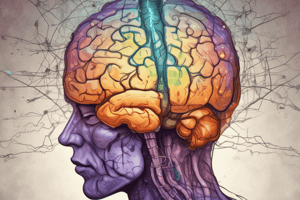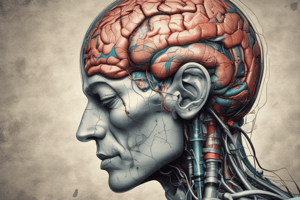Podcast
Questions and Answers
What is the primary mechanism of traumatic brain injury?
What is the primary mechanism of traumatic brain injury?
- Internal bleeding in the brain
- Infection of the brain tissue
- External force or trauma to the brain (correct)
- Genetic predisposition to brain damage
Which of the following is a secondary injury caused by traumatic brain injury?
Which of the following is a secondary injury caused by traumatic brain injury?
- Inflammation (correct)
- Falls
- Gunshot wounds
- Sports injuries
What is the characteristic of a mild traumatic brain injury?
What is the characteristic of a mild traumatic brain injury?
- Severe cognitive impairment
- No loss of consciousness at all
- Permanent loss of consciousness
- Brief loss of consciousness (24 hours) (correct)
Which of the following is a physical symptom of traumatic brain injury?
Which of the following is a physical symptom of traumatic brain injury?
What is the purpose of neuropsychological testing in diagnosing traumatic brain injury?
What is the purpose of neuropsychological testing in diagnosing traumatic brain injury?
What is a common treatment approach for traumatic brain injury?
What is a common treatment approach for traumatic brain injury?
Flashcards are hidden until you start studying
Study Notes
Definition and Causes
- Traumatic brain injury (TBI) is a type of injury that occurs when the brain is damaged as a result of external force or trauma.
- Causes of TBI include:
- Falls
- Motor vehicle accidents
- Violence (e.g. assault, gunshot wounds)
- Sports injuries
- Explosions or blasts
- Other injuries that cause the head to be struck or shaken
Pathophysiology
- Primary injury: immediate damage to brain tissue caused by the initial impact
- Secondary injury: further damage caused by subsequent events, such as:
- Inflammation
- Ischemia (reduced blood flow)
- Oxidative stress
- Excitotoxicity (overactivation of neurons)
Classification
- Mild TBI: concussion, characterized by:
- Brief loss of consciousness (<30 minutes)
- No apparent structural damage on imaging
- Moderate TBI: more severe symptoms, including:
- Longer loss of consciousness (30 minutes to 24 hours)
- Confusion or disorientation
- Memory or cognitive impairment
- Severe TBI: significant damage, including:
- Extended loss of consciousness (>24 hours)
- Coma or vegetative state
- Significant cognitive or motor impairment
Symptoms
- Physical symptoms:
- Headache
- Dizziness or loss of balance
- Nausea or vomiting
- Fatigue or lethargy
- Sensitivity to light or sound
- Cognitive symptoms:
- Memory loss or difficulty learning new information
- Confusion or disorientation
- Difficulty with concentration or attention
- Mood changes or irritability
- Emotional symptoms:
- Anxiety or depression
- Mood swings or emotional lability
- Irritability or aggression
Diagnosis and Treatment
- Diagnosis:
- Clinical evaluation
- Imaging studies (e.g. CT, MRI)
- Neuropsychological testing
- Treatment:
- Rest and recovery
- Medication management (e.g. pain relief, anxiety)
- Rehabilitation therapies (e.g. physical, occupational, speech)
- Cognitive training and behavioral therapy
Complications and Prognosis
- Complications:
- Post-concussive syndrome (persisting symptoms)
- Chronic traumatic encephalopathy (CTE)
- Seizures or epilepsy
- Hydrocephalus (fluid accumulation in the brain)
- Prognosis:
- Varies depending on severity and location of injury
- Generally, earlier and more aggressive treatment improves outcomes
- Full recovery may take months or years, or may not be possible in severe cases
Definition and Causes
- Traumatic brain injury (TBI) occurs when the brain is damaged due to external force or trauma.
- Causes of TBI include falls, motor vehicle accidents, violence, sports injuries, explosions, and other head injuries.
Pathophysiology
- Primary injury refers to immediate damage to brain tissue caused by the initial impact.
- Secondary injury is further damage caused by subsequent events, including inflammation, ischemia, oxidative stress, and excitotoxicity.
Classification
- Mild TBI (concussion) is characterized by brief loss of consciousness (less than 24 hours), coma, or vegetative state, and significant cognitive or motor impairment.
Symptoms
- Physical symptoms of TBI include headache, dizziness, nausea, fatigue, and sensitivity to light or sound.
- Cognitive symptoms include memory loss, confusion, difficulty with concentration, and mood changes.
- Emotional symptoms of TBI include anxiety, depression, mood swings, and irritability.
Diagnosis and Treatment
- Diagnosis involves clinical evaluation, imaging studies (CT, MRI), and neuropsychological testing.
- Treatment includes rest and recovery, medication management, rehabilitation therapies (physical, occupational, speech), cognitive training, and behavioral therapy.
Complications and Prognosis
- Complications of TBI include post-concussive syndrome, chronic traumatic encephalopathy (CTE), seizures, epilepsy, and hydrocephalus.
- Prognosis varies depending on severity and location of injury, but earlier and more aggressive treatment generally improves outcomes.
Studying That Suits You
Use AI to generate personalized quizzes and flashcards to suit your learning preferences.




